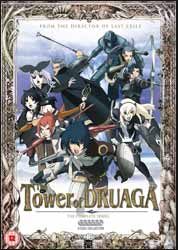|
Click here to return to the main site. DVD Review
Defeat the demon, save the kingdom, and don't forget those extra lives! In a summer once every five years, demons within the mysterious Tower of Druaga lose their powers due to a magic spell cast by a god named 'Anu'. During this time, King Gilgamesh, ruler of the kingdom of Uruk, and his army have invaded the Tower and built a fortress city on the very first floor. Thus begins the story of a warrior named Jil who embarks on a quest for the legendary Blue Crystal Rod, a powerful artefact said to be held on the highest floor of the Tower. However, others want the treasure for themselves... Animated series based on popular videogames tend to be a dispiriting proposition, most of them failing to substitute an involving storyline for the interactive element that's after all the main draw of any decent game. Japanese role-playing games would seem an obvious exception to the rule, with the storytelling techniques of popular series such as Final Fantasy growing ever closer to the conventions of TV anime; yet still most adaptations suffer from uninspired writing and direction, showing up the formulaic storylines most games still rely on for what they are. Games as varied and distinguished as Disgaea, Xenosaga, the Shin Megami Tensei: Persona series and Devil May Cry have all received anime retellings in recent years with underwhelming results; even the most enjoyable recent game-to-anime series, the absurdly slapdash historical free-for-all Sengoku Basara, was only a partial success. Where these series failed, though, The Tower of Druaga succeeds, and the key is in its irreverent attitude to its obscure 1980s arcade roots. Beginning with a bungled initial raid on the vertical dungeon that is the Tower, heroic young protagonist Jil and his coldly pragmatic elder brother Neeba, together with their allies, are drawn immediately into a wicked parody of fantasy adventure conventions. Side characters declare their simple ambitions to run baking shops just prior to being struck dead, boss monsters turn out to be rather less threatening (and shorter) than their reputations suggested and an attempt to rescue a hapless female ally from marauding tentacle-monsters is forestalled with an onlooker's hearty cry of 'Wait, it's just getting good!' The parody approach returns again and again in season one, with magical transformations into 8-bit sprite form playing hell with the characters' perceptions, and one full episode given over to recreating the original trials of The Tower of Druaga game, as Jil is forced to surrender control of his own body to the joystick-operating whims of his allies in attempt to clear a dungeon. The approach of placing ordinary people with credible reactions in silly fantasy settings is hardly a new one, and it's not one that Druaga sticks to with any particular determination - the actual plot is treated with fair seriousness - but the series does succeed in eliciting sympathy for the notion of real people trapped in the absurd, simplistic and arbitrarily contrived universe of a typical adventure game. The characters themselves are equally enjoyable. Jil is the very image of the wide-eyed idealistic hero, seeking to clear his deceased father's name and win the ultimate boon at the top of the tower; his relationship with his cynical brother, whose own reasons for scaling the tower are far less noble, is convincingly drawn. Pure-hearted priestess Kaaya seems so typical of the flatly characterised female leads seen in RPGs that it's easy to see how her less savoury hidden agenda evades Jil's notice. The secondary characters are a lot of fun, too: arrogant mage Melt behaves more like a spoilt golfing pro than a wise wizard and takes his sickeningly cute, hard-working assistant/caddy Coopa for granted; stoical female lancer Ahmey acts like Azumanga Daioh's taciturn Sakaki in armour; and Kelb, bluff general of the King's army also making its way up the tower, is so likeably eccentric he totally undercuts the usual blowhard persona expected of such characters. While the characters are fun, the story at times is a little too involved for them to carry, particularly in the second season where the complexities of the Tower's existence and its influence over King Gilgamesh tend to bog down the series in unwarranted seriousness. Visually the series is fine if not dazzling, with only some unattractive CGI - sadly typical of creators Gonzo and their tendency to cut corners - marring the proceedings, and a fine voice cast with plenty of chops in both adventure and comedy anime perform with distinction. Presented as it is as a complete two-season series, Druaga naturally loses the impact its first-season cliffhanger had - unless you wait six months to pop on the next disc - but at the same time it's a highly enjoyable series that only occasionally falters and soon picks up its pace again when it does. If only for the first season, it's well worth a look. 7 Richard Hunt |
|---|

